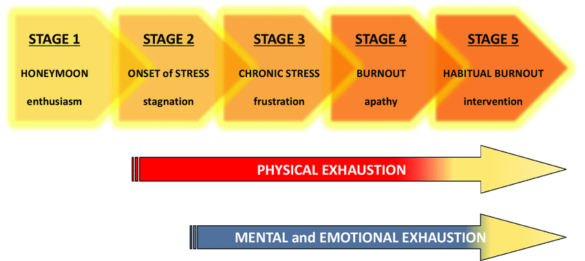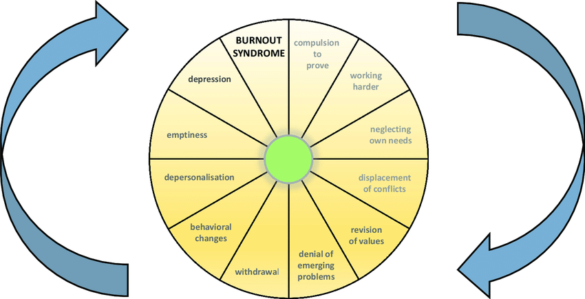It’s that time of year again. No, we’re not referring to putting up the Christmas tree or heading off on Christmas holidays, though those are on the horizon. It’s that time of year when the Christmas holidays feel within reach, but they’re not quite here. The time when parents (let’s be honest, mostly mums) are madly trying to determine what to buy the family for Christmas and if they’ve ticked off everyone from their list, and the time of year when all those loose ends at work must be tied up before we can finally relax. We like to think of it as the home straight, but sometimes that final straight can be the most stressful and it’s a common time of year for people to experience burnout.
Burnout typically refers to exhaustion caused by ongoing exposure to workplace stress, but students, retirees and stay-at-home mums can all experience a burnout of sorts too. While our jobs can contribute significantly to burnout, so can life admin, carrying the mental load of the family and caring for others.
The Anatomy of Work index conducted by Asana found that four in five Australians suffered burnout as “The shift to remote work has fueled chaos, resulting in longer hours, missed deadlines and burnout.”

Burnout (which can itself be a precursor to depression), and mental health disorders like Anxiety and Depression along with Suicidal Ideation and Substance Abuse have all continued to rise as people struggled to adjust to the fallout of the pandemic on their lives and the impact of lockdowns. According to a recent study conducted by Beyond Blue, “One in five Australians (21%) have taken time off work in the past 12 months because they felt stressed, anxious, depressed or mentally unhealthy.”
It’s likely that if you haven’t experienced burnout or a mental health disorder yourself, you’ve known someone who has. Our efforts to support struggling friends and family members can be mentally draining, emotionally exhausting and lead to burnout too.
| If you need to talk to someone immediately, the Mental Health Line is open 24/7 on 1800 011 511.
Other telephone crisis services are also open 24 hours a day, 7 days a week. You will also find other support and services by topic in the mental health services contacts list, |
So what do we do? How can we recognise the signs of burnout and stop it in its tracks before it really takes hold?
Recognising burnout
Thankfully, burnout doesn’t happen suddenly, but rather comes on slowly and allows us time to recognise signs of burnout before it takes hold.
It seems there’s no single consensus on just how many stages of burnout exist- there are 3, 4, 5 and 12 stages of burnout depending on who you speak to or what article you read! Below are two of the most commonly held theories of the stages, and we’ll let you decide which one sounds more like you!
How can we prevent burnout?
If you think you might be on your way to experiencing burnout, or are just really fatigued at this time of the year and would like to regain some control over your mental and physical health, the positive news is that our brains are incredibly powerful. We can take steps to derail the downward spiral before we truly burn out and we can also come back from experiencing burnout before it becomes a depressive mental illness.
The following strategies are recommended by multiple psychologists, and we encourage you to adopt as many of these positive habits as you can to ward off feelings of burnout.
Build resilience
Being resilient will help you to be less shaken by the stressors in your life. You can learn to build your mental resilience by challenging unhelpful thought patterns and processes. To do this, psychologists suggest you:
Set realistic goals and monitor them periodically to ensure they align with your values, skills and patterns. Don’t put any emphasis on things that are outside of your control and instead focus on what you can achieve.
Regularly reflect on your week and examine where you spent time that proved extraneous and unhelpful, then remove these actions from future weeks.
Make a list of positives. This should include your strengths, the things you can do confidently and are positive about, and things that you are grateful for. Keep it handy for when you are experiencing doubts or beginning to have negative self-talk.
Use Neurocycle (Formerly Switch App) to help you record and eliminate stress and anxiety by identifying toxic thinking and its cause, and replacing it with helpful thinking patterns.
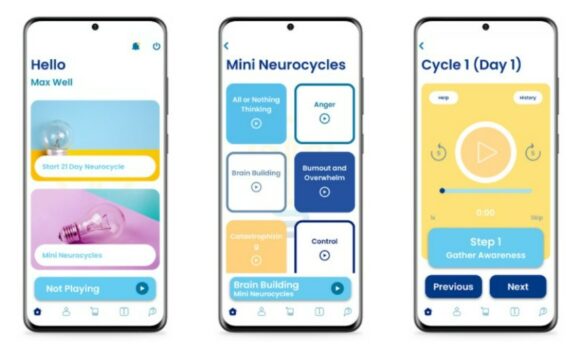 Check out this article for even more ways to build resilience.
Check out this article for even more ways to build resilience.
Ease up
Take more breaks. Sometimes when you’re feeling really due for a holiday it’s the worst possible time to take one, and if what you need a break from isn’t your job, but maybe your duties as a new mum or a carer for elderly parents, then this won’t always be possible. You should, however, try to include more breaks in your regular schedule. Attempt to schedule regular short breaks into your schedule where you can read, have a cup of tea, do a meditation, some stretching exercises, some star jumps, a quick walk, a nap- whatever will provide you with an emotional boost to help get you through to your next break.
Find more on the benefits of taking breaks and practical tips for making it happen here.
Schedule free time. When during your week will you find time to do the things you enjoy that make you feel alive again? Charting this information should be a priority for you, not an afterthought. At the beginning of your week, schedule this time in and plan how you will use it so that the time doesn’t pass you by or end up being spent doing mindless scrolling.
Be softer on yourself. For the sake of your mental health psychologists encourage you to let go of perfectionist behaviour or trying to do it all. Some weeks you’ll be a wonderful mum and your work might slip, other weeks you’ll excel in the workplace but may not be home in time to read to the kids before bed. That’s ok! Try these tips to avoid the pitfalls of perfectionism and learn how to stop trying to do it all.
Reduce your workload. If your workload is getting on top of you, there’s no shame in asking to reduce your hours or the number of projects you’re working on- and here’s how to tell your boss you’ve got too much work. You can also reduce your workload by delegating tasks. If you don’t feel like you’re working for someone who is approachable enough that you would feel comfortable asking to reduce your workload, then it may be worth reconsidering finding a work culture that aligns more closely with your value- which should always include mental health as a priority!
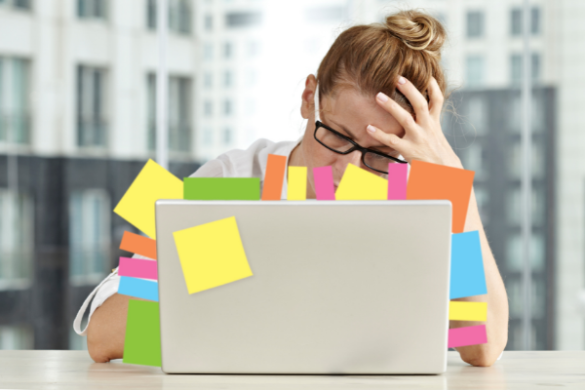
Cancel commitments. We often commit to things before we know what else will be happening at that time. If you have overcommitted to going somewhere or helping someone, Therapist Nedra Tawwab suggests saying “I know I said I could help you, but after looking at my schedule, I, unfortunately, can’t fit it in.” And you can propose another suitable time, if you feel you’ll be more available in the near future.
Switch between high and low priority tasks. Give your brain a break by trying to mix up the tasks you’re working on. If you’ve just completed a major high priority task, attempt to make your next task an easier one so that you are having somewhat of a mental rest, even if you do have to keep working.
Practice mindfulness
Switch off. Put your devices away. Leave them in another room when you sit down to relax in the evening so that you aren’t tempted to check your emails or messages and can let your brain focus on just one relaxing task, preferably one that doesn’t involve another screen like reading or completing a jigsaw puzzle. If TV is how you unwind, just limit yourself to that one screen and try to put some distance between your screen time and the sheets.
Put your worries in a box. When you lie down to sleep at night, imagine that you have a box you can store your worries in. They’ll still be there tomorrow but the mental visualisation of removing them from your mind and placing them in a box they can’t escape from will allow you to fall asleep more easily. You can also try quickly jotting them down before you lay down to sleep.
 Breathe Deeply. When we’re feeling stressed or anxious, our breathing naturally becomes more shallow. You can use deep breathing exercises to slow your breathing and heart rate, reduce tension and induce calm again. Try these breathing exercises for stress relief.
Breathe Deeply. When we’re feeling stressed or anxious, our breathing naturally becomes more shallow. You can use deep breathing exercises to slow your breathing and heart rate, reduce tension and induce calm again. Try these breathing exercises for stress relief.
Engage in mindful movement. Non-vigorous forms of exercise that are slow and encourage us to pay attention to our body parts can be very useful in helping us relieve stress. Yoga, meditation, stretching, Tai Chi and progressive muscle relaxation are all great examples that help us slow our breath and re-focus. You can find more quick and easy mindfulness activities here.
Listen to calming music. Music with a slower tempo (of about 60BPM) can help our alpha brainwaves (those present when we relax) synchronise to the beat and slow down. The types of music that have proven most effective include Celtic, Native American, Indian stringed instruments, drums and flutes. Nature sounds like thunder and rain, particularly when accompanied with soft jazz or classical music can also produce these calming effects. Listen to this list of songs, which rates highly for reducing stress.
Ensure strong physical health foundations
Good sleep habits
You can improve the quality of your sleep by trying the following tactics:
Try to keep a consistent bedtime. Studies suggest that falling asleep between 10 and 1pm is ideal and can even contribute to greater heart health.
Get quality sleep. Aim for 7 hours of unbroken sleep (sorry new mums, we know this is virtually impossible) and take 20-minute power naps when possible.
Find the right temperature. Ensure you’re not overheating during your sleep as a bedroom that’s too hot can make you restless, cause you to wake up and result in fatigue. Try these tips for keeping your room cool.
 Avoid watching TV immediately before bed as this will produce poor quality sleep that is racked with the anxiety and suspense of thrilling TV! Any other screens used in the 30 minutes prior to bedtime should be used with night-mode or a blue filter.
Avoid watching TV immediately before bed as this will produce poor quality sleep that is racked with the anxiety and suspense of thrilling TV! Any other screens used in the 30 minutes prior to bedtime should be used with night-mode or a blue filter.
Effective exercise
You’ve heard it before because it is endorsed as a solution to almost every mental health problem. Exercise can do wonders for both your mind and body and doesn’t have to involve an hour-long gym workout. Boost your energy, sharpen your focus and increase your concentration by adding in a little extra exercise. Tips for squeezing in more exercise include:
Embrace mini-workouts, that you can squeeze into small gaps in your workday, or even in commercial breaks, can also be effective in providing you with clarity and a much needed emotional boost.
Walk whenever you can. Even if driving to your destination is unavoidable, park a little further away so you’ve created a nano workout for yourself. Every step counts.
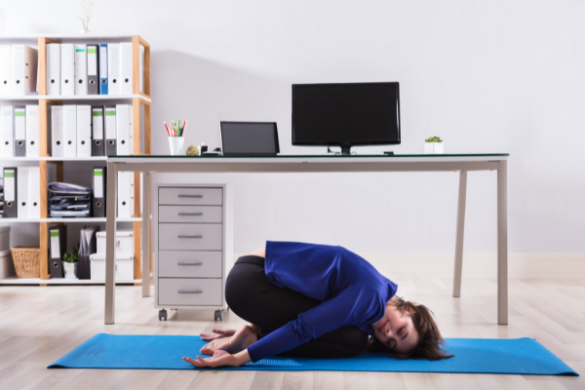
Especially for those working from home, create a commute. Before you start your working day, and after you finish, try a walk or run around the block, which will help you create that separation between family-life and working-life before you begin work and will help you decompress at the end of the day before diving back into home duties.
Looking after your body
Sometimes, people think they’re feeling mentally burnt out when the cause is partially, or completely, physical. Eliminate sluggish physical health and poor diet from the possible causes of your burnout by doing the following:
Eat a healthy and balanced diet that contains GABA boosting foods, which help reduce stress, like fish, eggs, tomatoes, broccoli, walnuts and cheese. Reduce foods that are high in sugar, fats or simple carbs, which are likely to adversely affect your mood and energy levels.
Get your fill of vitamins and minerals. Deficiencies in vitamin D, vitamin B-12, iron, magnesium, or potassium can all lead to fatigue. A simple blood test can rule out these deficiencies as the culprit of your flat feelings.
 Drink tea. Research has found that black, green and decaffeinated teas have been found to help reduce stress and “even a very small amount of GABA-fortified oolong tea leads to a significant effect on acute stress levels.” Stopping to sip on a fragrant cup of herbal tea like Peppermint, Licorice, Ginger, Jasmine, Lemon Balm, Licorice or Chamomile is also recommended for producing calming effects that help slow the body down and cope with stress.
Drink tea. Research has found that black, green and decaffeinated teas have been found to help reduce stress and “even a very small amount of GABA-fortified oolong tea leads to a significant effect on acute stress levels.” Stopping to sip on a fragrant cup of herbal tea like Peppermint, Licorice, Ginger, Jasmine, Lemon Balm, Licorice or Chamomile is also recommended for producing calming effects that help slow the body down and cope with stress.
Avoid nicotine and alcohol. Though people often turn to these substances to calm down, nicotine and alcohol actually contribute to higher anxiety levels.
Seek support
Talk to someone you trust. Opening up to people you trust about the negative feelings you are experiencing is perhaps the most important thing you can do to look after your mental health. The people you confide in will likely have had some insight into what you have been experiencing but should also have enough distance from the situation that they can see it clearly and provide objective support, and possibly helpful solutions too. If you don’t feel like there is anyone in your life you feel comfortable opening up to, you can always seek advice and support from the Mums of the Shire community– they are a lovely, helpful bunch!
Create a check-in network. If you don’t already have people you regularly check in with, and who regularly check in with you, set it up! Let someone, or a couple of close friends, know that you’d really appreciate it if they could check in with you once or twice a week (however regularly you feel is necessary) and suggest that you could do the same for them if they would value that. Helping others assists in relieving our own negative feelings so this is an arrangement that everyone will benefit from.
 Speak to a professional.
Speak to a professional.
If you need to talk to someone immediately, the Mental Health Line is open 24/7 on 1800 011 511.
Other telephone crisis services are also open 24 hours a day, 7 days a week.
You will also find other support and services by topic in the mental health services contacts list.
We hope these tips are useful in helping you alleviate whatever difficulties you are experiencing and that you take steps towards your wellness every day.
If you are just looking for practical tips to feel more awake, there are Quick fixes for the mum who’s tired AF and Easy energy boosters on our blog too. And if you’re just feeling a bit blah, or languishing (as we’ve come to understand it), then you may like to check out our Guide to feeling good during a pandemic, part one and part two.

